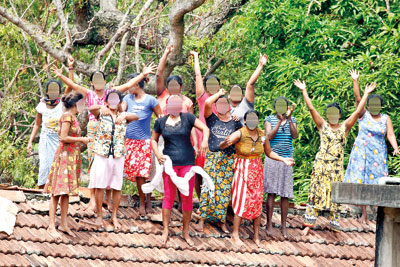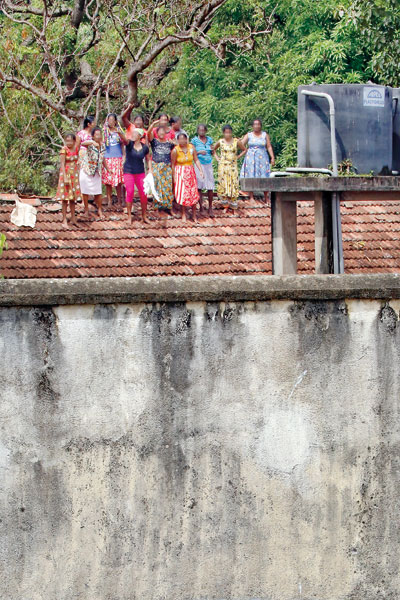News
Authorities and prisoner rights activists trade barbs over riots
A legal battle is looming between the Prisons Department and an organisation representing the rights of prisoners following the recent protests by female remand prisoners at the Welikada Prison.
After Monday’s protests by female prisoners turned violent, 61 inmates were transferred to other prisons. The Prisons Department claims they were directly involved in the unrest.
Prisons Superintendent and spokesperson Thushara Upuldeniya said the inmates had been transferred to prisons in Galle, Kalutara and Kandy, while the department had appointed a team headed by an Assistant Superintendent of Prisons to conduct an internal probe on the incident.
The Welikada Prison has about 3,500 inmates in total. Prior to last week’s transfers, about 425 of those inmates were females, according to the prisons spokesman.
He vowed that the department would take legal action against those found to have been involved in the violence. They could be charged under the Prisons Ordinance for offences including mutiny, attacking prison officers and causing damage to state property, Superintendent Upuldeniya added.
Monday’s rooftop protest by Welikada prison’s female inmates came a week after a similar protest. During the protest on August 13, female inmates expressed their anger and frustration at what they claimed were continued delays in their court cases and lack of adequate sanitary and other facilities for female inmates. About 23 inmates took part in the first roof-top protest, which was subsequently called off after discussions with officials from the Ministry of Justice and Prison Reforms.
In the clashes that followed the second protest on Monday, eight prison officers and three female inmates suffered injuries, the prisons spokesman said.
The Committee for Protecting Rights of Prisoners (CPRP), however, claims that many more female inmates were injured in the protest than the figures given by the authorities. Its president, Attorney-at-Law Senaka Perera, alleged that prison officers brutally suppressed the protest and many injured female inmates were denied hospital treatment. “They sent in male prison officers to break up the protest. Many prisoners were injured. Some of them were transferred to other prisons without their injuries being treated,” he claimed.
Mr Perera said the female inmates’ protest was the culmination of frustrations built up over time due to continued delays in their court cases as well as lack of basic facilities within the prison. “Prisons Ministry officials promised to provide solutions to the problems within two weeks, which was why the first protest was called off.
Prisons officials, though, then proceeded to target those who led the protest, resulting in the beating of a female prisoner and her transfer to Wariyapola. This was what led to the second protest.”

Female prisoners protest owing to frustrations due to continued delays in their court cases as well as lack of basic facilities within the prison.Pix by M. A.Pushpa Kumara
Mr Upuldeniya, however, refuted allegations that an inmate was assaulted. “We transferred one female inmate suspected to be involved in trafficking drugs within the prison. There was no assault.”
Mr Perera alleged that the prison authorities were recording statements from inmates who were cooperating with them to build a case against the protesters.
He said the CPRP was also planning to file legal action against the prisons authorities over the incident.
Dismissing the allegations that the protesters were selling drugs inside the prisons, Mr. Perera charged that Justice and Prison Reforms Minister Thalatha Atukorale was attempting to use the current public anger at drug traffickers to justify their action against the prisoners. “The crimes they are accused of are irrelevant. The inmates were protesting against the issues they faced. Moreover, if there is drug trafficking within the prison, it can’t happen without the knowledge and encouragement of the authorities. Shouldn’t action be taken against such officers for facilitating it?” he queried.
Mr Perera said the Government’s handling of the incident sets a bad example in addressing issues faced by prisoners. “The prisons system should be about rehabilitation, of trying to reintegrate inmates with society. What is happening now is that the authorities are trying to demonise prisoners in general and are increasingly trying to isolate them, making rehabilitation extremely difficult.”
A senior Justice Ministry official who spoke on conditions of anonymity acknowledged that some of the grievances made by the inmates were genuine. He admitted that some female inmates had been in remand custody for almost five years due to various procedural issues such as reports by the police and the government analyst’s department.
“We gave the case reports to the Justice Minister and she said she would discuss them with the Attorney General and Chief Justice,” the official said. However, he added that among the protesters were some who were in and out of prison “as a habit” on drugs-related offences, and were instigating other inmates to agitate.
Prisons spokesperson Upuldeniya also acknowledged that overcrowding was a major issue at the Welikada Prison, even in the female wards. This, in turn, contributed to problems regarding facilities for prisoners, he said. In a bid to lessen overcrowding, some inmates were earlier transferred to the new prison in Angunukolapelessa.
A permanent solution to overcrowding, though, would require the building of more new prisons, he said.

